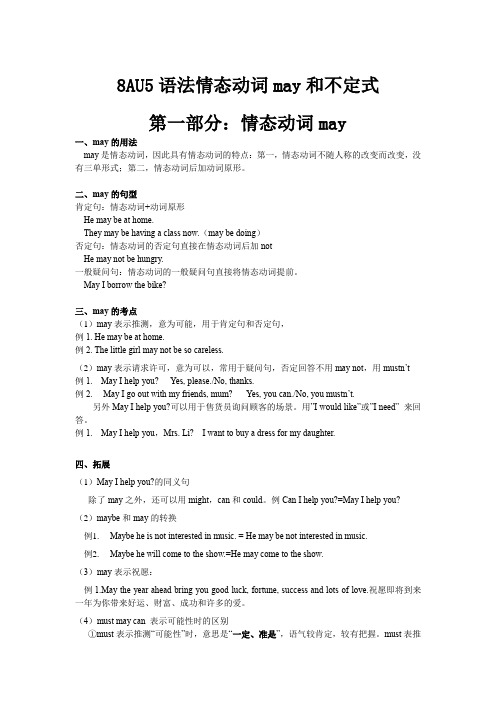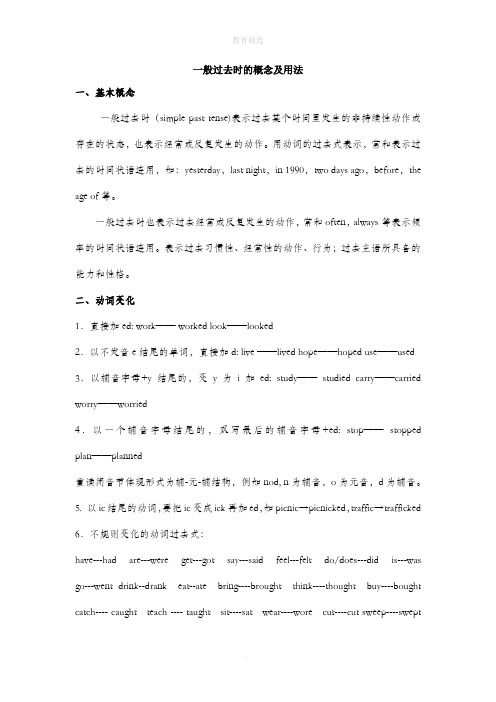八年级英语上册动词的运用
人教版英语八年级上册unit9canyoucometomyparty单元语法

人教版英语八年级上册unit9canyoucometomyparty单元语法单元语法小专题(Grammar Focus)语法精讲情态动词can的用法1.can是情态动词,没有人称和数的变化,但有时态的变化,它的过去式为could,其后可直接接动词原形,其用法如下:(1)表示能力,意为“能,会”。
如:Can you swim?你会游泳吗?Can you answer the question?你能回答这个问题吗?(2)表示许可,意为“可以”,相当于may(比may更口语化,may较正式)。
此外,could也可以表示许可,语气更加委婉。
如:Can/May I come in?我可以进来吗?Can you help me?你能帮我吗?You may go home now.你现在可以回家了。
Could you help me find it?你能帮我找到它吗?(3)用于提出邀请。
对其作肯定回答通常用“Sure./Of course./Certainly./Yes,I'd love to.”等,作否定回答通常用“Sorry/No,I can't.”等。
如:—Can he come to my party?他能来参加我的派对吗?—Yes.He'd love to.是的。
他很乐意。
—Can you go to the baseball game?你能去看棒球比赛吗?—Sorry,I can't.对不起,我不能。
(4)用于否定句或疑问句中,表示推测。
如:Mr.Wang can't be at home.王老师不可能在家里。
2.can的句式变化(1)在变否定句时,直接在后面加上“not”,写作can't或cannot。
如:I can speak French.我会讲法语。
→I can't speak French.我不会讲法语。
(2)在变一般疑问句时,can直接移到主语前(原主语的首字母改成小写,第一人称应变为第二人称)即可。
U5情态动词may和不定式2022-2023学年牛津译林版八年级英语上册

8AU5语法情态动词may和不定式第一部分:情态动词may一、may的用法may是情态动词,因此具有情态动词的特点:第一,情态动词不随人称的改变而改变,没有三单形式;第二,情态动词后加动词原形。
二、may的句型肯定句:情态动词+动词原形He may be at home.They may be having a class now.(may be doing)否定句:情态动词的否定句直接在情态动词后加notHe may not be hungry.一般疑问句:情态动词的一般疑问句直接将情态动词提前。
May I borrow the bike?三、may的考点(1)may表示推测,意为可能,用于肯定句和否定句,例1. He may be at home.例2. The little girl may not be so careless.(2)may表示请求许可,意为可以,常用于疑问句,否定回答不用may not,用mustn’t例1.---May I help you?----Yes, please./No, thanks.例2. ---May I go out with my friends, mum? ----Yes, you can./No, you mustn’t.另外May I help you?可以用于售货员询问顾客的场景。
用”I would like”或”I need” 来回答。
例1.---May I help you,Mrs. Li?---I want to buy a dress for my daughter.四、拓展(1)May I help you?的同义句除了may之外,还可以用might,can和could。
例Can I help you?=May I help you?(2)maybe和may的转换例1.Maybe he is not interested in music. = He may be not interested in music.例2.Maybe he will come to the show.=He may come to the show.(3)may表示祝愿:例1.May the year ahead bring you good luck, fortune, success and lots of love.祝愿即将到来一年为你带来好运、财富、成功和许多的爱。
北师大版英语八年级上册Unit1 一般过去时的概念及用法

一般过去时的概念及用法一、基本概念一般过去时(simple past tense)表示过去某个时间里发生的非持续性动作或存在的状态,也表示经常或反复发生的动作。
用动词的过去式表示,常和表示过去的时间状语连用,如:yesterday,last night,in 1990,two days ago,before,the age of等。
一般过去时也表示过去经常或反复发生的动作,常和often,always等表示频率的时间状语连用。
表示过去习惯性、经常性的动作、行为;过去主语所具备的能力和性格。
二、动词变化1.直接加ed: work—— worked look——looked2.以不发音e结尾的单词,直接加d: live ——lived hope——hoped use——used 3.以辅音字母+y结尾的,变y为i加ed: study——studied carry——carried worry——worried4.以一个辅音字母结尾的,双写最后的辅音字母+ed: stop——stopped plan——planned重读闭音节体现形式为辅-元-辅结构,例如nod, n为辅音,o为元音,d为辅音。
5. 以ic结尾的动词,要把ic变成ick再加ed,如picnic→picnicked,traffic→trafficked 6.不规则变化的动词过去式:have---had are---were get---got say---said feel---felt do/does---did is---was go---went drink--drank eat--ate bring----brought think----thought buy----bought catch---- caught teach ---- taught sit----sat wear----wore cut----cut sweep----sweptsleep——slept see----saw become----became read——read7.以辅元辅结尾的加d三、用法(1)一般过去时表示在过去某个特定时间发生,也可以表示过去习惯性、经常性的动作。
八年级上册译林版中英语情态动词的用法归纳总结含答案

八年级上册译林版中英语情态动词的用法归纳总结含答案一、选择题1.-Do you think the rain will stop tomorrow?-_____. It has rained for four days. It’s too wet everywhere.A.I hope not B.I don’t think soC.Don’t worry D.I hope so2.—Anna, can you come to my party tomorrow night?—_________, but I have to stay at home because of the flu.A.I’d love to B.Sounds good C.That’s OK D.Why not 3.—The game is too hard for me. I will certainly lose.—________. You should never say no before you try.A.Forget it! B.Come on! C.I’m sorry.D.Pardon me? 4.—I’m afraid I can’t find the key to the car.—______. I’ll wait for you. We have enough time.A.Hurry up B.All rightC.It is up to you D.Hold your horses5.—Here’s your change.—________A.My pleasure. B.Thank you. C.With pleasure. D.No problem. 6.—I plan to find a part-time job in the coming summer holiday.—________ It will be a totally different experience.A.See you later. B.You’d better not.C.I’m sorry to know that.D.That sounds like fun.7.—Oh, no! There isn't any salt left.—____________! I’ll buy some when I go into town.A.Good idea B.Go ahead C.Never mind D.Not at all 8.— I find it difficult to fall asleep before exams. Could you help me?— ___________. We have helped many students with similar problems.A.No problem B.Come on C.Well done D.What a pity 9.—I was too busy to see the singing competition.—________. I have to say it’s really wonderful.A.No problem B.You are welcome C.Not at all D.It’s a pity 10.—Amazingly, I've managed to finish the project by myself.—___________I told you it was easyA.With pleasure. B.Guess what? C.There you are! D.It doesn’t matter 11.—I’m sorry. That wasn’t of much help.— ________. In fact, it was most helpful.A.Thanks anyway B.It doesn’t matter C.Of course not D.Sure it was 12.—Don’t forget to keep safe distance (距离) at least one meter, Mike!—________A.Sorry, I won’t.B.No, I can’t do it.C.Not at all. D.I hope not.13.—I prefer western food. It’s delicious and good for us.—_______ ? But western food is said to be high in sugar and fat.A.Is that right B.How do you know thatC.Do you really think so D.Who told you that14.—Another Friday! Let’s go to see the play tonight.—________ I will book the tickets online.A.My pleasure. B.That’s right.C.Why not? D.Never mind. 15.— Could you please clean your room?—_________. I’ll do it at once.A.Yes, sure B.Sorry, I can’t C.It doesn’t matter D.Here you are 16.-Do you mind telling me how to use this function? - . It’s easy. Just double-click on the “Pencil” icon.A.No, not at all B.Of course, I doC.Yes, I do D.Yes, I don’t17.—Would you please help me with my spoken English?—__________. First you should know practice makes perfect.A.That’s right B.No problem C.Quite well D.No, thanks 18.—Lucy, can you help me with my history?—________. I am good at it.A.With pleasure B.I’m afraid not C.Sorry, I can’t D.No way 19.— Shall we go to Nanjing Green Expo Park to enjoy the beautiful flowers this afternoon?—________. Let’s go there by bike.A.I think so B.That’s all right C.My pleasure D.Sounds great 20.—TV says there will be a heavy rain tomorrow.—________. I planned to go climbing with my friend.A.Bad luck B.I hope so C.Good idea D.I don’t mind 21.—I missed the basketball game last Saturday because I had an exam.—________, but it will be repeated on TV.A.Take it easy B.You are lucky C.That’s wonderful D.Never mind 22.—I’m sorry I didn’t make it to your birthday party last night.— ________ I know you are busy recently.A.Why not? B.Don’t mention it.C.No way. D.That’s all right. 23.—Excuse me, can you give me some water? The cup is empty.—________A.Go ahead. B.My pleasure C.At your service D.You’d better not. 24.—I’m going hiking this afternoon. Would you like to go with me?—______, but I must finish my homework first.A.Sorry, I don’t B.That’s rig ht C.I’d love to D.Not at all 25.—It’s been a wonderful party. Thank you very much?—- ________________.A.With pleasure B.No , thanks C.It’s OK D.I’m glad you enjoyed it .26.—I wonder if Tenny is doing well in her new school.—________. She is old enough to look after herself well.A.You’re welcome B.Good luck C.It’s a pity D.No need to worry 27.—Could you help me look after my baby ________ I am away?—________.A.as; With pleasure B.while; My pleasure C.as; That’s all right D.while; With pleasure28.—How would you like your soup?—________.A.Very delicious B.With some tomatoes and eggs, please C.I like it very much D.No, thanks29.—Time is up. I have to go now.—________ ! We don’t have more time to talk.A.That’s cool B.That’s the answer C.That’s a pity D.That’s good news 30.—How do you find the documentary DA VID Profile(国宝档案).—________. I can’t think too highly of it.A.It all depends B.It’s really wonderfulC.No one knows for certain D.It is not my cup of tea31.—Would you mind if I open the window?—_______.We need fresh air.A.Not at all B.Yes, of course C.You’d better not D.That’s all right 32.—I find it really unwise to go travelling during May Day holiday.—________! Wherever you go, it’s crowded with cars and people.A.Not exactly B.Forget it C.You said it D.It depends 33.— Mr. Smith, I won the first prize in the competition.—______ I think you’ll do better and better.A.Congratulations! B.Good idea! C.That’s all right!D.What a shame! 34.—He is too short to be a successful basketball player.—________ Every dog has its day.A.I think so. B.It’s hard to say.C.That’s right.D.You’d better not. 35.—Hi, everybody! Here is the music.—________. Let’s dance to the music.A.That’s no good B.Here we go C.That’s a shame D.Have a good time 36.— Mike, are you ready for the coming final exam?— ________. I have prepared it for weeks.A.You bet B.No deal C.Bad luck D.Have fun 37.—Liz, I’d like to take a week’s holiday.—________. We’re as busy as a bee.A.Go ahead B.With pleasure C.Forget it D.That’s right 38.—How about putting some pictures into the report?—________ A picture is worth a thousand words.A.I don’t think so.B.Why not?C.Thank you. D.Don’t mention it.39.—Why don’t you join in a club to practise speaking English?—________.A.That’s a good idea B.Never mind C.Yes, please D.Thank you 40.—Many people think women are better at cooking than men.—________. Most top chefs in the world are men.A.I agree B.I can’t agree more C.Not at all D.That’s not the case 41.— Wow, what a good smell! Can I have a piece of cake?— ________A.No way. B.Good idea! C.HeIp yourself. D.What a pity! 42.—I’ll have a chemistry exam tomorrow.—________!A.Well done B.Congratulations C.You’re welcome D.Good luck 43.—Summer camping gives children the chance to live away from home.—________. It is always good to help children grow up.A.That’s true.B.Come this way. C.Let me have a look. D.I don’t think we agree.44.—Do you think you could finish this project without help?—________. This is not the first time for me.A.Take care B.Don’t worry C.Not exactly D.Hurry up 45.—We can invite Kate and Paul to Baohe Park with us.—________ I’ll give them a call right now.A.Why not? B.What for? C.What’s up?D.Are you kidding? 46.—We’ll study in different schools next term. I hope you’ll enjoy your time in the new school!—________A.I’ll take your advice. B.The same to you. C.Congratulations!D.It doesn’t matter.47.— The movie Lost in Russia sends a message about the importance of family.— ________. It reminds me of my parents.A.I hope so B.That’s all right C.You bet D.I don’t think so 48.— Are you feeling any better now after taking the medicine?—________. I’m feeling even worse.A.You got it B.Never mind C.Sorry to hear that D.Quite the opposite 49.— I guess you want to play tennis in the park this afternoon.—_______. That’s exactly what I was thinking just now.A.It’s up to you B.Of course not C.You read my mind D.It’s hard to say 50.— Do you think Steve will pass the exam this time?— ________! He spends most of his time playing games on the phone.A.Promise B.No way C.Well done D.No problem【参考答案】***试卷处理标记,请不要删除一、选择题1.D【解析】试题分析:I hope not我希望不是,I don’t think so我不认为这样,Don’t worry不要担心,I hope so我希望如此。
期末语法复习五:情态动词、祈使句(知识点+习题) 22-23外研版八年级英语上册

electronic bikes.
A. Keep
В.To keep
C. Keeping
D. Kept
12.---Must I stay here with you, Mum?
---No, you ______ You may go home now, but you ______ go to the Internet
Cafe.
A. mustn't; needn't
B. needn't; mustn't C. must; need D. need; must
13. It's rather windy today. Put on some warm clothes, ________ you'll catch a
В. needn't
C. mustn't
D.can’t
3.-_______the endangered animals from now on, or they will die out one day.
-Yes, you are right.
A. Protecting B. To protect
C. Protect
【例】 Stop! 停下来! Cut up these bananas.把这些香蕉切碎。
(2)Be型:Be+表语(+其他)! 【例】Be a good boy!做一个好孩子!
(3)Let型:Let+宾语+动词原形(+其他). 【例】Letmehelpyou.让我来帮你。
(4)No+ v.-ing 形式/名词! 【例】 No smoking!禁止吸烟! No photos!不准拍照!
初中英语 外研社八年级上语法知识点-情态动词(PPT26张)

D. should
C 5. You ______ return the book now. You can keep it till next week if you like.
I need buy a big house. He need drive me home.
Need I buy a big house ?
-- Yes, you must. -- No, you needn’t / don’t have to. (不必要)
11
② 实意动词 (need to do sth)
A. must B. would C. may 15
3. — Dad, may I watch TV?
— No. You _A_ finish your homework first.
A. must
B. can
C. may
4. — Bob, shall we go and meet our new
13
have to 表示客观因素 We are very glad at the party, but mother is ill, so we have to leave now .
must 表示主观ຫໍສະໝຸດ 素 We must study hard to find a good job for ourselves .
--- Yes, you must. --- No, you don't have to/ needn't.
7
1.--Must I come before eight o'clock?
D --No, you _______.”
外研版八年级英语上册情态动词专题复习
Where shall we go for our holidays? _W__e__c_o_u_ld__g_o_t_o__F_r_a_n_c_e_. _________(法国) What shall we have for dinner tonight? _W__e__c_o_u_ld__h_a_v_e_f_i_sh__. ____________(吃鱼) What shall I give Ann for her birthday? _Y__o_u_c_o_u_l_d_g_i_v_e_h__er__a_b_o_o_k_._______(书) When shall I phone Diana? _Y__o_u_c_o_u_l_d_p__h_o_n_e_h_e_r__n_o_w_._______(现在)
A. may not B. mustn’t C. couldn’t D. needn’t
疑问句:? ➢ Why must you always be finding fault with me? ➢ If you must smoke, at least you could use an
ashtray(烟灰缸).
—Oh, I see.We _______ waste water.
A. can B. must C. mustn’t 否定句:禁止,严禁
D. needn’t
( )2.Children _______ play on the road or in the street.
It is dangerous.
4. Whatever you do, you _m_u_s_t_n’_t touch the switch. It’s very dangerous.
译林版英语八年级上册谓语动词表
译林版英语八年级上册谓语动词表本文档旨在整理译林版英语八年级上册中出现的谓语动词,帮助学生更好地掌握和运用这些动词。
一、一般动词1. play - 玩耍、打球2. study - 研究、研究3. eat - 吃4. drink - 喝5. sleep - 睡觉6. run - 跑步7. walk - 散步、走路8. swim - 游泳9. read - 阅读10. write - 写作11. speak - 说话、讲话12. listen - 听13. watch - 观看14. draw - 画画15. sing - 唱歌16. dance - 跳舞17. jump - 跳跃18. climb - 攀爬19. drive - 开车20. ride - 骑(自行车、马等)二、状态动词1. be - 是、存在2. have - 拥有、有3. like - 喜欢4. love - 爱5. hate - 讨厌、憎恶6. want - 想要、希望7. need - 需要8. prefer - 更喜欢、宁愿10. feel - 感觉11. seem - 似乎、好像12. appear - 出现、显得13. sound - 听起来14. taste - 尝起来15. smell - 闻起来三、助动词1. can - 能够、可以2. could - 可以、能够(过去式)3. will - 将要、会4. would - 将、想要5. may - 可能、也许6. might - 可能、也许(过去式)7. shall - 将要、应该8. should - 应该、应当9. must - 必须10. ought to - 应该、应当11. need to - 需要以上是译林版英语八年级上册中常见的谓语动词,希望对学生们的学习有所帮助。
人教版英语八年级上册08动词不定式(基础讲解)
动词不定式【概念引入】1. 动词不定式名言:(1)动词不定式作表语To lose is to learn. 失败就是学习。
(2)动词不定式作主语It is better to give than to take. 给予比接受更好。
(3)不定式作宾语Expect to be treated as you have treated others.你怎样待别人,就指望别人怎样待你。
(4)不定式作宾补Adversity causes some men to break,others to break records.逆境使一些人崩溃,也使一些人破记录。
(5)不定式作定语There is a time to talk and a time to act.该说的时候说,该做的时候做。
(6)不定式作目的状语To find the exact answer,one must first ask the exact question.要找到确切的答案,首先必须提出确切的问题。
2. 动词不定式定义:动词不定式是一种非谓语形式(不能作谓语),基本形式是to do形式(to是不定式符号的标志,无意义,可以不翻译)肯定式:to + 动词原形否定式:not to + 动词原形【用法讲解】1.动词不定式的特征动词不定动式是一种非谓语动词形式,它没有人称和数的变化,在句子中不能作谓语,但可以作除谓语之外的其它任何句子成分(主语、表语、宾语、宾语补足语、定语和状语);动词不定式具有名词、形容词和副词的特征,同时还保持动词的某些特点,既可以有自己的宾语和状语,动词不定式和它的宾语和状语构成不定式短语。
2. 动词不定式在句子中的作用动词不定式是由to+动词原形构成,在句中起名词,形容词和副词的作用,可以担任除谓语以外的其它任何成分。
(1)动词不定式作主语。
例如:To master a language is not an easy thing.掌握一门语言不是一件容易的事情。
八年级上册英语单词organize短语
一、organize的基本含义organize是一个动词,其基本含义是“组织”、“安排”。
在实际应用中,这个单词通常用来描述整理、安排、管理事物的过程或行为。
二、organize的相关短语1. organize a party这个短语指的是“组织一场派对”,在日常生活中经常可以听到类似的用法,例如:“She is organizing a party for her birthday next week.”2. organize a meeting这个短语表示“组织一次会议”,在商务场合常常能够听到这样的用法,比如:“The boss wants to organize a meeting with all department heads tomorrow.”3. organize a trip这个短语意思是“组织一次旅行”,例如:“We are planning to organize a trip to the beach next month.”4. organize a charity event这个短语表示“组织一次慈善活动”,比如:“The localmunity isorganizing a charity event to r本人se money for the homeless.”5. organize a protest这个短语指的是“组织一次抗议活动”,在政治和社会运动中经常可以听到这样的用法,例如:“The activists are organizing a protest ag本人nst government policies.”6. organize your time这个短语意思是“合理安排时间”,例如:“You need to learnhow to organize your time better in order to be more productive.”7. organize your thoughts这个短语表示“整理思绪”,比如:“Before the presentation, make sure to organize your thoughts and practice your speech.”8. organize an exhibition这个短语表示“组织一次展览”,例如:“The art gallery is organizing an exhibition of contemporary artists.”9. organize a team这个短语表示“组建一支队伍”,比如:“The coach is organizing a new team for the uingpetition.”10. organize apetition这个短语指的是“举办一次比赛”,例如:“The school is organizing a swimm ingpetition for the students.”三、organize的常见用法1. organize的用法不仅限于实际行动上的组织和安排,还可以用来指“在头脑中整理思路”的意义。
- 1、下载文档前请自行甄别文档内容的完整性,平台不提供额外的编辑、内容补充、找答案等附加服务。
- 2、"仅部分预览"的文档,不可在线预览部分如存在完整性等问题,可反馈申请退款(可完整预览的文档不适用该条件!)。
- 3、如文档侵犯您的权益,请联系客服反馈,我们会尽快为您处理(人工客服工作时间:9:00-18:30)。
八年级英语上册动词的运用
1. 动词的基本概念和分类
1.1 动词的定义
动词是表示动作、状态或存在的词类。
在句子中,动词通常作为谓语,用于说明主语所做的动作或所处的状态。
1.2 动词的分类
动词根据其词性和用法可以分为以下几类:
•实义动词:表示具体的行为、动作或感受,如run(跑)、eat(吃)。
•系动词:用来连接主语和表语,表示状态或描述,如be(是)、seem(似乎)。
•助动词:用来帮助构成时态、语态等,如do、have等。
•情态动词:用来表示说话人的意愿、能力、推测等,如can(能)、may (可能)。
2. 动词的时态和语态
2.1 动词的时态
动词的时态用来表示动作发生的时间。
英语中常见的时态有以下几种:
•一般现在时:表示经常性的习惯或客观事实,如I go to school every day (我每天上学)。
•一般过去时:表示过去发生的动作或状态,如She watched a movie last night(她昨晚看了一部电影)。
•一般将来时:表示将来要发生的动作或状态,如I will go to the park tomorrow(我明天要去公园)。
•现在进行时:表示现在正在进行的动作,如He is playing soccer now(他正在踢足球)。
•过去进行时:表示过去某个时间正在进行的动作,如She was reading a book at 8 p.m. yesterday(昨天晚上八点钟她正在读一本书)。
2.2 动词的语态
动词的语态用来表示动作的主体和受体之间的关系。
英语中常见的语态有以下几种:
•主动语态:表示主语执行动作,如She eats an apple(她吃一个苹果)。
•被动语态:表示主语接受动作,如An apple is eaten by her(一个苹果被她
吃了)。
3. 动词的用法
3.1 不定式的用法
不定式是动词的一种形式,一般由to + 动词原形构成。
不定式可以作为动词
的宾语、主语、表语、定语和状语等。
•作宾语:He wants to go to the park(他想去公园)。
•作主语:To learn English is important(学英语很重要)。
•作表语:Her goal is to become a doctor(她的目标是成为一名医生)。
•作定语:The book to read is on the desk(要读的书在桌子上)。
•作状语:She studies hard to improve her grades(她努力学习以提高成绩)。
3.2 动词的不定式短语
动词的不定式短语由不定式和附加成分构成,通常用于表示目的、原因、方式等。
•目的状语:She went to the store to buy some groceries(她去商店买些杂货)。
•原因状语:He stayed up late last night to finish his homework(他昨晚熬夜
做完作业)。
•方式状语:They celebrated the victory by singing and dancing(他们通过唱
歌跳舞庆祝胜利)。
3.3 动词的时态和语态的运用
动词的时态和语态的运用在句子中起到了非常重要的作用。
正确使用不同的时态和语态可以准确表达所要表达的意思。
•时态的运用可以用来描述动作的发生时间,使句子更加准确和具体。
•语态的运用可以使句子更加灵活和丰富,表达能力更强,同时加强了句子的逻辑结构。
4. 动词的错误使用和纠正
4.1 动词时态的错误使用
动词时态的错误使用常见有以下几种情况:
•在描述历史事件时错误使用一般现在时,正确应该使用一般过去时。
•在描述已经安排好的将来事件时错误使用一般现在时,正确应该使用一般将来时。
•在描述一段时间的动作或状态时过分使用一般现在时,应该使用现在进行时。
4.2 动词语态的错误使用
动词语态的错误使用常见有以下几种情况:
•在描述主动的动作时错误使用被动语态,应该使用主动语态。
•在描述被动的动作时错误使用主动语态,应该使用被动语态。
•在描述某种情况或状态时错误使用被动语态,应该使用系动词。
5. 结语
动词是英语中非常重要的一部分,掌握好动词的基本概念和分类,合理运用动词的时态和语态,能够让我们的表达更加准确、丰富和生动。
同时,要注意避免常见的动词使用错误,提高我们的语言表达能力。
